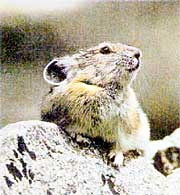The rabbit that lives in the mountains of the USA has disappeared from several sites; A reduction in fishing in Lake Tanganyika in Africa, which is a source of protein for 4 countries

American pike. The warming also affects alpine areas
https://www.hayadan.org.il/hachada1.html
The weather moved from the back pages to the headlines last summer. The world is following with concern the effects of the heat wave that afflicts Europe, with attention being given mainly to the human victims. However, two recently published studies indicate no less serious effects of global warming.
The first points to the American pika, a mountain relative of the hare, as one of the first mammals that may fall victim to climate change and become extinct. The second study deals with the reduction of the fish harvest in Lake Tanganyika in Africa following these changes. This trend could damage the food supply to the countries bordering the lake - Burundi, Congo, Tanzania and Zambia.
The pika, or in its Latin name, Ochotona princeps, is a tailless creature about the size of a hamster. The researchers who followed the poplar populations, and whose research was published in the US Journal of Mammalogy, believe that the animal is on the verge of extinction. She lives between the edges of the forest and the peaks of the mountains. When the temperatures outside rise, Pika has to climb up the mountain to find a suitable growing environment. In the winter, she lives under the snow in tunnels she has dug, and feeds on piles of grass she has stored in them.
In the study, conducted between 1994 and 1999, sites were surveyed in the "Great Basin", east of the Sierra Nevada and west of the Rocky Mountains, where productions were observed in the past. The researchers discovered that pika populations in 25 sites decreased by about 30%.25 In seven of the 86 sites, pikas disappeared completely in the last XNUMX years - a period in which, according to the data, climate change took place. The places are so remote, and the habitat apparently has not changed significantly over the years, so it seems that there is no other influential factor that caused the reduction of populations besides the change in climate.
The American pika - which is active on the surface of the ground in the early morning hours - is particularly exposed to the effect of global warming, because it lives in areas with a cool, rather humid climate, such as those found near mountain peaks.
"The loss of productivity is troubling because scientists assumed that alpine and subalpine ecosystems were relatively unaffected by climate change, due to their isolation," said Eric Beaver of the US Geological Survey's Forest and Rangeland Ecosystem Research Center. According to Beaver, who is the lead author of the study, "the response of the pika populations indicates the effects of climate change in these ecosystems as well."
Many mountain animals in the Northern Hemisphere may migrate north or seek higher altitude habitats due to climate changes. But it seems that the American pika lacks the means that other species have to deal with the environmental development. "The American pika is like the canary in the coal mines," Katrina Cardoso, head of the UK Wildlife Fund's climate change research program, told The Guardian. environmentally irreversible. We must switch to clean and recyclable energy sources before it is too late for us and for Pika."
At the same time, a study was published in the journal Nature, according to which climate change has significantly reduced the fish harvest in Lake Tanganyika. Katherine O'Reilly of the University of Arizona and her colleagues found that over the past 100 years, lake water temperatures have risen and wind speeds have fallen. As a result, the flow of nutrients from the depth of the water to the upper layers of the lake was impaired and the amount of algae was reduced, in a way that negatively affected the fish population.
The study joins the findings published last month in Science and adds evidence that "the effect of climate change on the regional temperature is more significant for Lake Tanganyika than the human activity of the local residents", as written in an accompanying article in Nature
Fish from the lake provide more than a quarter of the animal protein consumption for the residents of the countries bordering the lake. If, as expected, the air temperature in the region rises by about 1.5 degrees Celsius in the next 80 years, this may have additional negative consequences for the food supply to the residents.
Environmentalist - Earth
They know endangered animals
https://www.hayadan.org.il/BuildaGate4/general2/data_card.php?Cat=~~~621506088~~~32&SiteName=hayadan
